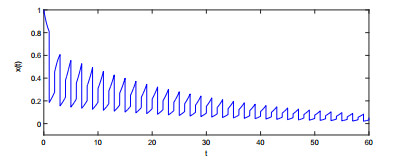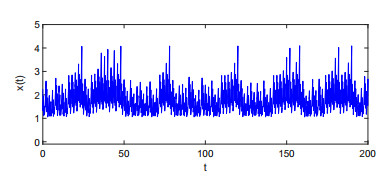|
[1]
|
F. Abedi, W. J. Leong and S. S. Chaharborj, Exponential input-to-state stability of composite stochastic systems. Advances in Difference Equations, 2013, 2013(1), 1-10.
Google Scholar
|
|
[2]
|
Z. Ai and G. Zong, Finite-time stochastic input-to-state stability of impulsive switched stochastic nonlinear systems, Applied Mathematics and Computation, 2014, 245, 462-473. doi: 10.1016/j.amc.2014.07.092
CrossRef Google Scholar
|
|
[3]
|
W. Chen and W. Zheng, Input-to-state stability and integral inputtostate stability of nonlinear impulsive systems with delays, Automatica, 2009, 45, 1481- 1488. doi: 10.1016/j.automatica.2009.02.005
CrossRef Google Scholar
|
|
[4]
|
W. Chen and W. Zheng, Brief paper: input-to-state stability and integral inputto-state stability of nonlinear impulsive systems with delays, Automatica, 2009, 45, 1481-1488. doi: 10.1016/j.automatica.2009.02.005
CrossRef Google Scholar
|
|
[5]
|
W. Chen, S. Xu and Y. Zou, Stabilization of hybrid neutral stochastic differential delay equations by delay feedback control, Systems & Control Letters, 2016, 88, 1-13.
Google Scholar
|
|
[6]
|
S. Dashkovskiy and A. Mironchenko, Input-to-state stability of nonlinear impulsive systems, SIAM Journal on Control and Optimization, 2012, 51, 1962-1987.
Google Scholar
|
|
[7]
|
S. Dashkovskiy and P. Feketa, Input-to-state stability of impulsive systems and their networks, Nonlinear Analysis: Hybrid Systems, 2017, 26, 190-200. doi: 10.1016/j.nahs.2017.06.004
CrossRef Google Scholar
|
|
[8]
|
S. Dashkovskiy and P. Feketa, Input-to-state stability of impulsive systems with different jump maps, IFAC-Papers Online, 2016, 49(18), 1073-1078. doi: 10.1016/j.ifacol.2016.10.310
CrossRef Google Scholar
|
|
[9]
|
G. Feng, Master-slave synchronization of chaotic systems with a modified impulsive controller, Advances in Difference Equations, 2013, 2013(1), 1-12.
Google Scholar
|
|
[10]
|
L. Gao, D. Wang and G. Wang, Further results on exponential stability for impulsive switched nonlinear time-delay systems with delayed impulse effects, Applied Mathematics and Computation, 2015, 268, 186-200. doi: 10.1016/j.amc.2015.06.023
CrossRef Google Scholar
|
|
[11]
|
L. Hou, X. Zhao, H. Sun and G. Zong, l2-l∞ filtering of discrete-time switched systems via admissible edge-dependent switching signals, Systems & Control Letters, 2018, 113, 17-26.
Google Scholar
|
|
[12]
|
J. P. Hespanha, D. Liberzon and A. R. Teel, On input-to-state stability of impulsive systems, In Proceedings of the 44th IEEE Conference on Decision and Control, and the European Control Conference, Seville, Spain, 2005, 12- 15.
Google Scholar
|
|
[13]
|
J. P. Hespanha and A. S. Morse, Stabilization of nonholonomic integrators via logic-based switching, Automatica, 1999, 35, 385-393. doi: 10.1016/S0005-1098(98)00166-6
CrossRef Google Scholar
|
|
[14]
|
J. P. Hespanha, D. Liberzon and A. R. Teel, Lyapunov conditions for input-tostate stability of impulsive systems, Automatica, 2008, 44, 2735-2744. doi: 10.1016/j.automatica.2008.03.021
CrossRef Google Scholar
|
|
[15]
|
O. M. Kwon, M. J. Park, J. H. Park, S. M. Lee and E. J. Cha, Stability and stabilization for discrete-time systems with time-varying delays via augmented Lyapunov-Krasovskii functional, Journal of the Franklin Institute, 2013, 350, 521-540. doi: 10.1016/j.jfranklin.2012.12.013
CrossRef Google Scholar
|
|
[16]
|
X. Li, P. Li and Q. Wang, Input/output-to-state stability of impulsive switched systems, Systems & Control Letters, 2018, 116, 1-7.
Google Scholar
|
|
[17]
|
X. Li, J. Cao, An impulsive delay inequality involving unbounded time-varying delay and applications, IEEE Transactions on Automatic Control, 2017, 62, 3618-3625. doi: 10.1109/TAC.2017.2669580
CrossRef Google Scholar
|
|
[18]
|
X. Li and S. Song, Stabilization of delay systems: Delay-dependent impulsive control, IEEE Transactions on Automatic Control, 2017, 62, 406-411. doi: 10.1109/TAC.2016.2530041
CrossRef Google Scholar
|
|
[19]
|
X. Li and J. Wu, Stability of nonlinear differential systems with state-dependent delayed impulses, Automatica, 2016, 64, 63-69. doi: 10.1016/j.automatica.2015.10.002
CrossRef Google Scholar
|
|
[20]
|
X. Li and Y. Ding, Razumikhin-type theorems for time-delay systems with Persistent impulses, Systems & Control Letters, 2017, 107, 22-27.
Google Scholar
|
|
[21]
|
X. Li, X. Zhang and S. Song, Effect of delayed impulses on input-to-state stability of nonlinear systems, Automatica, 2017, 76, 378-382. doi: 10.1016/j.automatica.2016.08.009
CrossRef Google Scholar
|
|
[22]
|
B. Liu, D. J. Hill and Z. Sun, Input-to-state-KL-stability with criteria for a class of hybrid dynamical systems, Applied Mathematics and Computation, 2018, 326, 124-140. doi: 10.1016/j.amc.2018.01.002
CrossRef Google Scholar
|
|
[23]
|
B. Liu, D. J. Hill and Z. Sun, Input-to-state exponents and related ISS for delayed discrete-time systems with application to impulsive effects, International Journal of Robust and Nonlinear Control, 2018, 28(2) 640-660. doi: 10.1002/rnc.v28.2
CrossRef Google Scholar
|
|
[24]
|
H. Li, Z. Zhang, H. Yan and X. Xie, Adaptive event-triggered fuzzy control for uncertain active suspension systems, IEEE Transactions on Cybernetics, 2018.
Google Scholar
|
|
[25]
|
H. Li, Y. Wang, D. Yao and R. Lu, A sliding mode approach to stabilization of nonlinear Markovian jump singularly perturbed systems, Automatica, 2018, 97, 404-413. doi: 10.1016/j.automatica.2018.03.066
CrossRef Google Scholar
|
|
[26]
|
J. Liu and A. R. Teel, Invariance principles for hybrid systems with memory, Nonlinear Analysis: Hybrid Systems, 2016, 21, 130-138. doi: 10.1016/j.nahs.2015.08.003
CrossRef Google Scholar
|
|
[27]
|
J. Liu, X. Liu and W. Xie, Class-KL estimates and input-to-state stability analysis of impulsive switched systems, Systems & Control Letter, 2012, 61, 738-746.
Google Scholar
|
|
[28]
|
X. Liu and P. Stechlinski, Hybrid control of impulsive systems with distributed delays, Nonlinear Analysis: Hybrid Systems, 2014, 11, 57-70. doi: 10.1016/j.nahs.2013.06.003
CrossRef Google Scholar
|
|
[29]
|
X. Liu and G. Ballinger, Uniform asymptotic stability of impulsive delay differential equations, Computers & Mathematics with Applications, 2001, 41, 903-915.
Google Scholar
|
|
[30]
|
X. Liu, K. Zhang and W. Xie, Consensus seeking in multi-agent systems via hybrid protocols with impulse delays, Nonlinear Analysis: Hybrid Systems, 2017, 25, 90-98. doi: 10.1016/j.nahs.2017.03.002
CrossRef Google Scholar
|
|
[31]
|
V. Lakshmikantham, D. Bainov and P. Simeonov, Theory of Impulsive Differential Equations, World Scientific, 1989.
Google Scholar
|
|
[32]
|
C. Ning, Y. He, M. Wu and S. Zhou, Indefinite Lyapunov functions for inputto-state stability of impulsive systems, Information Sciences, 2018, 436.
Google Scholar
|
|
[33]
|
C. Ning, Y. He, M. Wu and S. Zhou, Indefinite derivative Lyapunov-Krasovskii functional method for input to state stability of nonlinear systems with timedelay, Applied Mathematics and Computation, 2015, 270, 534-542. doi: 10.1016/j.amc.2015.08.063
CrossRef Google Scholar
|
|
[34]
|
M. J. Park, O. M. Kwon and S. G. Choi, Stability analysis of discrete-time switched systems with time-varying delays via a new summation inequality, Nonlinear Analysis: Hybrid Systems, 2017, 23, 76-90. doi: 10.1016/j.nahs.2016.08.001
CrossRef Google Scholar
|
|
[35]
|
S. Peng, F. Deng and Y. Zhang, A unified Razumikhin-type criterion on inputto-state stability of time-varying impulsive delayed systems, Systems & Control Letters, 2018, 116, 20-26.
Google Scholar
|
|
[36]
|
E. D. Sontag, Smooth stabilization implies coprime factorization, IEEE Transactions on Automatic Control, 1989, 34, 435-443. doi: 10.1109/9.28018
CrossRef Google Scholar
|
|
[37]
|
I. Stamova, T. Stamov and X. Li, Global exponential stability of a class of impulsive cellular neural networks with Supremums, International Journal of Adaptive Control and Signal Processing, 2015, 28(11), 1227-1239.
Google Scholar
|
|
[38]
|
X. Tan, J. Cao and X. Li, Consensus of Leader-Following Multiagent Systems: A Distributed Event-Triggered Impulsive Control Strategy, IEEE Transactions on Cybernetics, 2018, 99, 1-10.
Google Scholar
|
|
[39]
|
X. Tan, J. Cao and X. Li, Leader-following mean square consensus of stochastic multi-agent systems with input delay via event-triggered control, IET Control Theory & Applications, 2017, 12(2), 299-309.
Google Scholar
|
|
[40]
|
X. Wu, Y. Tang and W. Zhang, Input-to-state stability of impulsive stochastic delayed systems under linear assumptions, Automatica, 2016, 66, 195-204. doi: 10.1016/j.automatica.2016.01.002
CrossRef Google Scholar
|
|
[41]
|
X. Zhang, X. Lv and X. Li, Sampled-data based lag synchronization of chaotic delayed neural networks with impulsive control, Nonlinear Dynamics, 2017, 90, 2199-2207. doi: 10.1007/s11071-017-3795-4
CrossRef Google Scholar
|
|
[42]
|
X. Zhang and X. Li, Input-to-state stability of nonlinear systems with distributed-delayed impulses, IET Control Theory & Applications, 2017, 11, 81-89.
Google Scholar
|
|
[43]
|
Q. Zhang, S. Chen and C. Yu, Impulsive consensus problem of second-order multi-agent systems with switching topologies, Communications in Nonlinear Science and Numerical Simulation, 2012, 17, 9-16. doi: 10.1016/j.cnsns.2011.04.007
CrossRef Google Scholar
|
|
[44]
|
X. Zhou, X. Liu and S. Zhong, Stability of delayed impulsive stochastic differential equations driven by a fractional Brown motion with time-varying delay, Advances in Difference Equations, 2016, 2016(1), 328.
Google Scholar
|






 DownLoad:
DownLoad:
